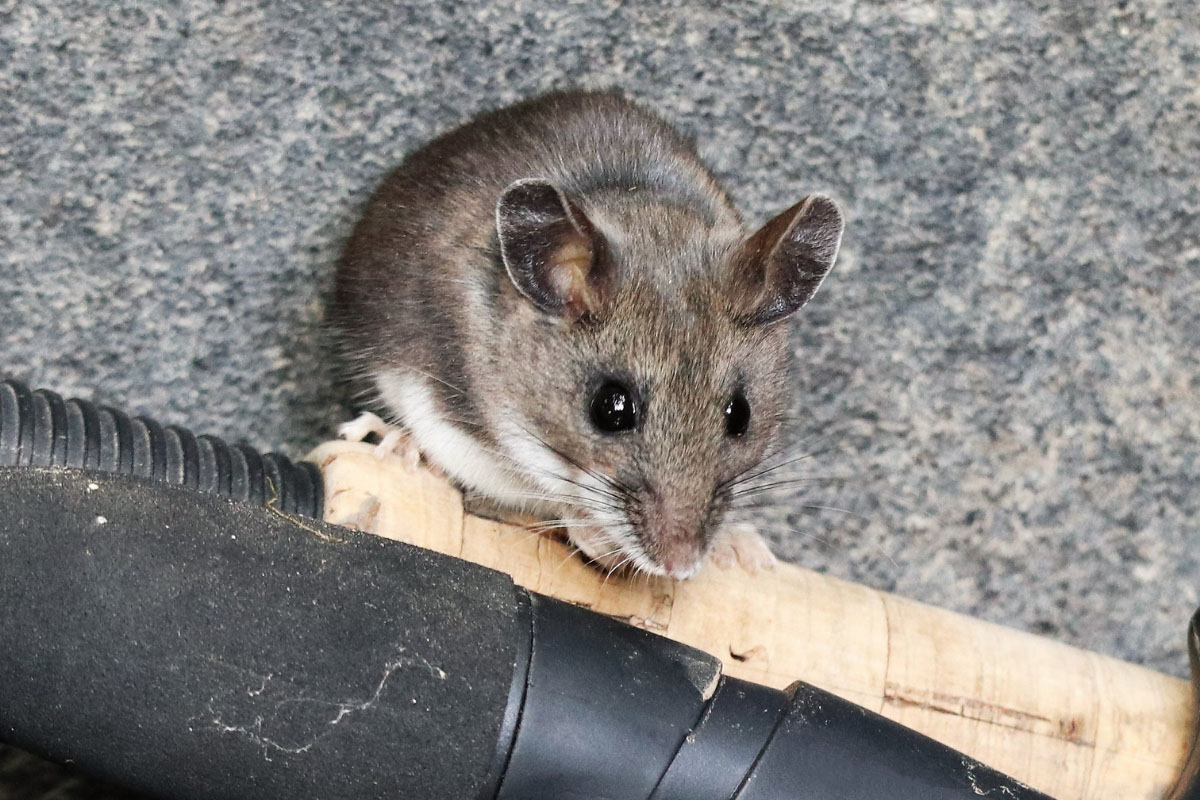- CALL US: 905.318.1242
Deer Mice
Deer mice (Peromyscus maniculatus) are small and slender rodents with brown or grey fur and white fur on their feet and belly. The undersides of their tail are also white, making them easy to identify on sight. Like house mice, deer mice have round and slender bodies ranging in length from three to four inches. Their tails can be anywhere from two to five inches long.
Diet
Being omnivorous, deer mice eat a wide range of foods. In the wild this includes seeds, grains, fruits, nuts, flowers, and different types of bugs and insects. In urban areas, they will consume human and pet food as well as cockroaches and houseflies. For when cold weather arrives, they will gather food and store it for winter consumption.
Despite their tiny size, deer mice eat between 15 and 20 times a day. When they enter homes between October and February, they will typically set up their nests close to your kitchen area in order to have convenient access to food and water. You may notice signs of an infestation in the kitchen first.
Where to find them
If you live near woodlands or fields, deer mice may try to get into your home during the fall to seek shelter from the cold. In the wild, they form underground burrows to avoid predators, so once they access manmade structures like homes and cottages, they will go into walls to build nests made from fur and whatever they can scavenge from the property, such as paper and insulation.
Reproduction rate
Female deer mice can have up to 11 litters a year, each one with anywhere from one to nine babies. The offspring are fully weaned at four weeks of age and capable of reproducing at five weeks old. An interesting feature about deer mice is that their litter sizes are larger when food resources are plentiful, so once they get into your home, you could be dealing with a rapidly-growing infestation.
Common diseases
Deer mice are one of the few rodents that carry the Hantavirus. This virus has multiple strains, one of which can cause a deadly disease called hantavirus pulmonary syndrome, or HPS, a deadly disease. Not all mice carry HPS, but if you are bitten by an infected animal or exposed to their droppings, urine, or saliva, you can become extremely ill.
Deer mice are also known carriers of the deer tick, which can transmit Lyme disease. Left untreated, Lyme disease can cause people to develop serious and life-changing neurological complications.
Other illnesses include:
- Salmonella, which can result when mouse feces come into contact with human food sources.
- Tularemia, which is characterized by eye irritation and inflammation and swelling of lymph glands in front of the ear.
Signs of an infestation
Like most small rodents, deer mice try to avoid exposure to humans, so you may not see one unless you’re nocturnal too! There are still signs that these mice may have taken up residence in your home, namely:
- Hearing strange noises (scratching, skittering, gnawing) coming from your walls or attic
- Droppings throughout the home, particularly in the kitchen area- a single deer mouse produces 50 to 75 droppings per day!
- Urine smell in areas close to nesting sites
- Signs of gnawing on wood and paper objects as well as electrical wires
- Footprints and tail marks on dusty surfaces
- Chew marks on food containers
How to keep them out of your home
You can tackle a deer mouse problem using measures that work for keeping out house mice. This includes:
- Sealing gaps around cables, pipes or wires running into the home through the walls or foundation
- Storing all food securely in the refrigerator or a container made from metal or glass
- Placing screens across your chimney openings
- Keeping all door and window screens in good condition
- Installing weather stripping around your doors and windows (includes your garage door)
- Keeping food waste and household garbage in tightly sealed containers until collection day
Need deer mice control services?
Deer mice may look cute and harmless, but an estimated 6% of them carry the dangerous Hantavirus. They can also damage your home by chewing on wood fixtures and create a fire hazard by gnawing on electrical wires. While you may be able to prevent an infestation from growing by laying poison and traps, deer mice are such prolific breeders that you should call a professional exterminator.
At Action Pest Control, we can remove deer mice from your home or cottage without presenting a health or safety risk to children or pets. We are also available 24/7, so you don’t have to wait for professional support. For more information about how we can help you with your deer mice problem, contact Action Pest Control.








